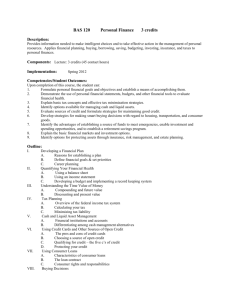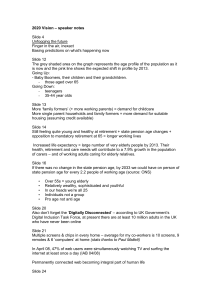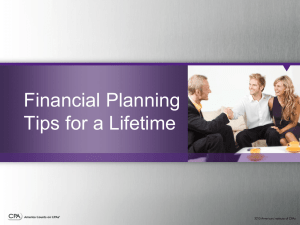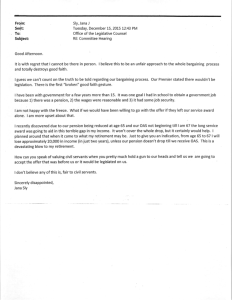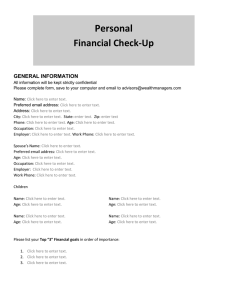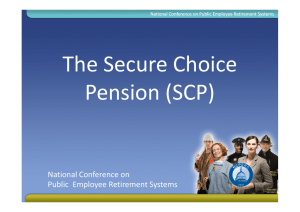Supplier Market Analysis
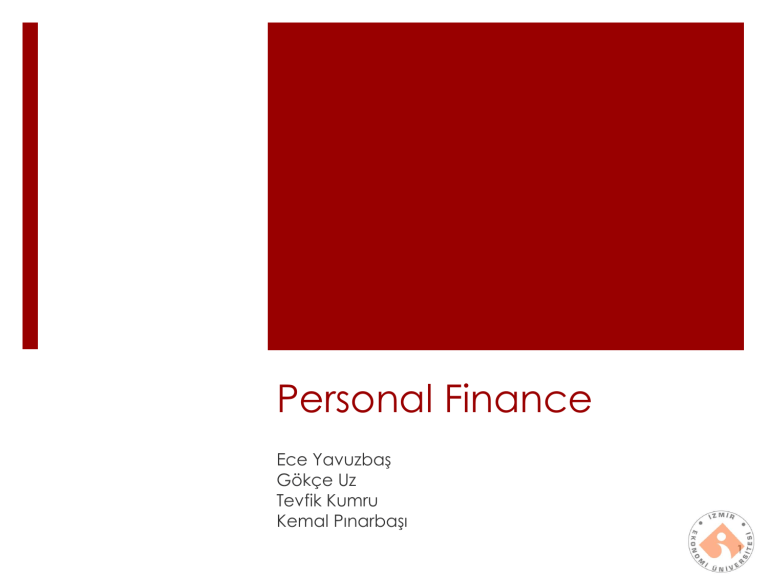
Personal Finance
Ece Yavuzbaş
Gökçe Uz
Tevfik Kumru
Kemal Pınarbaşı
1
2
Outline
Definition
Benefits
Financial position
Adequate protection
Tax planning
Investment and accumulation goals
Retirement planning
Estate planning
Personal Budget
Software Programs
It’s not your salary that makes you rich, it’s your spending habits.
Charles A. Jeffe
3
4
Definition of
Personal Finance
Personal finance is defined as the way in which an individual or a family makes decisions in relation to their financial portfolio.
Personal financial plan: a plan that specifies your financial goals and describes the spending, financing, and investing plans that are intended to achieve those goals
5
Benefits of
Personal Finance
• Personal Financial Planning may not help you to earn more money, but it will help you to use your money more wisely.
• As part of your personal financial plan, think about what is important to you.
What do you want to accomplish?
6
Benefits of
Personal Finance
• Budgeting
• Savings
• Investment
• Risk Management
• Cash-flow management
7
Components
• Financial position
• Adequate protection
• Tax planning
• Investment and accumulation goals
• Retirement planning
• Estate planning
8
Financial Position
Financial planning needs to understand what his/her/their financial situation is.
Household assets
Household liabilities
Household cash flow
9
Financial Position
Develop and implement a budget
Calculate your net worth (wealth) using a balance sheet
Develop a personal income statement and use it to analyze your spending
Introduce budgeting software: Quicken,
Mint.com and others
10
Adequate Protection
Protected in event of an emergency must also be in place
Natural disasters and death
Buying insurance for each of these areas
Risk Allocation
Tax Planning
Certainties: Taxes and Death
Income
Value of Assets
Single largest expense in a household
Tax deductions
Credits
11
Impacts of Taxes
Goals Budget
Estate
Planning
Retirement
Planning
Taxes
Investing
Cash
Management
Savings and Debt
Insurance
12
Investment and accumulation goals
Planning how to accumulate enough money for large purchases
Major reasons to accumulate assets include purchasing a house or car, starting a business
,paying for education expenses and saving for retirement
Major risk to the households, the rate of price increases over time or inflation
Investment and accumulation goals
Financial planners suggest regular savings in a variety of ınvestments
The investment portfolio has to get a higher rate of return
Investors risk attitudes vary from person to person
These types of financial goals require careful planning and secure investments.
Retirement planning
Personal finance involves planning for your or your families retirement
You need to know how much money do you need to be retired and how do you finance this retirement
Private Pension
Private pension
Private pension
This is a long-term investment that are used by intermediaries instead of you
When you come retirement age, you obtain a sum of money
Payments are deposited to the Takasbank.They
are under the control of government
You can see your fund fluctuations on web site.
Retirement companies
Advantages of the private pension
A small amount of contribution is paid each month
You can earn more money with less money
You can determine the degree of risk
You don’t need to pay an other fee when devolved into another company
Funds are conducted by professional portfolio managers
The allocation of funds can be changed six times a year
There is no loss of money
Disadvantages of the private pension
To be long-term investment
You have to pay operating expenses like 8%
Fund operating deductions are made
If you exit the system less than 10 years,10% is interrupted
When you evaluating the savings at exchange,you have to pay a tax for earning per tl to the government.however ıf you evaluate the saving at private pension companies, government don’t get a tax from you.
Estate Planning
• Estate planning involves planning for what will happen when you die, and planning for the tax due to the government at that time.
• Estate planning typically attempts to eliminate uncertainties over the administration of a probate and maximize the value of the estate by reducing taxes and other expenses.
21
Personal Budget
A personal budget is a finance plan that allocates future personal income towards expenses, savings a and debt re-payment.
22
Cash Flow Trade Off’s
Key Cash Management tradeoffs:
1. The Risk-Return trade off
2. The Spending-Investment Risk trade off
3. The Time Expended-Return trade off
23
Softwares 24
25
Conclusion
How can people protect themselves against unforeseen personal events, as well as those in the external economy?
How can family assets best be transferred across generations (bequests and inheritance)?
How does tax policy (tax subsidies and/or penalties) affect personal financial decisions?
How does credit affect an individual's financial standing?
How can one plan for a secure financial future in an environment of economic instability?
26
Thank You For Your
Attention
Do you have any question?

